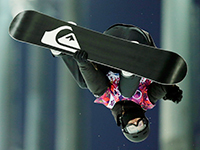Why do Russian athletes leave Russia?
Why do Russian athletes compete for other countries sometimes? This question is not new - it was discussed in the country after Russia's failure at Winter Olympics in Vancouver. However, nothing has changed. Many say that every athlete has personal reasons to choose a foreign flag to compete for. Maybe, but Russian sports federations have done nothing to offer Anastasia Kuzmina, Darya Domracheva and Yuri Podladchikov better conditions to return to the national team of Russia?
Indeed, Yuri Podladchikov's parents moved to Switzerland when he was a boy. Yuri spent his entire childhood there. Kuzmina made a decision to compete for Slovakia under the influence of her husband, a foreign citizen. Domracheva was too nostalgic for her homeland - Belarus. This is a view of Anna Dmitrieva, a Soviet tennis player, Honored Master of Sports of the USSR, a commentator. "The world is so diverse today that people choose a country where it is more convenient for them to live," said Anna Dmitrieva told Pravda.Ru. Yet, Maria Sharapova is a resident in the United States, but she still competes for Russia.

Other experts that we interviewed believe that Russian athletes switch to a different camp on a permanent basis. The first reason, according to them, is the fact that some athletes may find themselves useless for Russia. An athlete may presume that he or she is underestimated by their coach, especially at the stage of transition from junior to adult. For example, Anastasiya Kuzmina was underestimated during the junior stage. So says former coach of the Russian Ski Team, Yury Kaminsky, who trained 2010 Olympic champion Nikita Kryukov. "This is a law, which works not only in sports but also in science, art," said Yury Kaminsky.
Another question is why those athletes who leave start to "run faster." According to Yury Kaminsky, competition in Russia is always tough. "In smaller foreign countries, they give athletes a tranquil environment for training, they do not ask athletes to reach the peak of shape twice - during the qualifying round and for the main start of the season."
Well, Russian biathletes do not perform to reach the peak of their shape, and the world championship in biathlon in 2013 was generally a failure for Russia.
From the perspective of coaching staff, Kaminsky believes that Russia has lost the system of preparing the coaching staff. "In skiing, there is no longer a high school of coaches. I use the lectures from 20 years ago. Progress appeared a short while ago, they started to use advanced technology, but this work is for long-term dividends," said the expert.
The second set of reasons touches upon the sports that are poorly funded in Russia, where the technical base is poor and qualified coaches are extremely hard to find. This is, for example, freestyle, where Yuri Podladchikov won the gold medal, Kaminsky said. However, one may only wonder why nothing has been done in seven years in the sports where there is a technical basis (Sochi won the right for the Olympics seven years ago). To crown it all, no sports federation has ever said during preparations for the Winter Games that it was a matter of financial character.
Here emerges the third set of problems associated with the activities of national federations, i.e. sport officials, who are always right and not accountable to anyone. Yuri Podladchikov competed for Russia in Turin, but after the conflict with the National Freestyle Federation, he opted for Switzerland, where by that time he had been living and training for about 10 years.
There are positive examples, though. Tatiana Borodulina, the leader of women's national short track, who had competed for Australia, returned to the Russian team. The federation also invited Victor An, a Chinese athlete, to Russia.
Nevertheless, what can be said about the biathlon team, if the head of the Biathlon Union, Mikhail Prokhorov, does not listen to the general public. Not only the whole country, but recent results suggest that Wolfgang Pichler, whom Prokhorov cherished, would not achieve desired results at the Olympics. Russia has no idea what this German specialist does at the helm of the national team.
Mikhail Prokhorov built a huge 20,000-strong arena for his basketball team in New York. There are no such facilities in Russia. He was once asked during a television program why he built a superexpensive arena in America, but not in Russia, his native country. Prokhorov responded that he built the arena in America to create Russia's positive image abroad.
We can only say that it is not arenas in America, but Olympic medals of Russian athletes that create Russia's positive image abroad.
Lyuba Lulko
Pravda.Ru
Subscribe to Pravda.Ru Telegram channel, Facebook, RSS!


